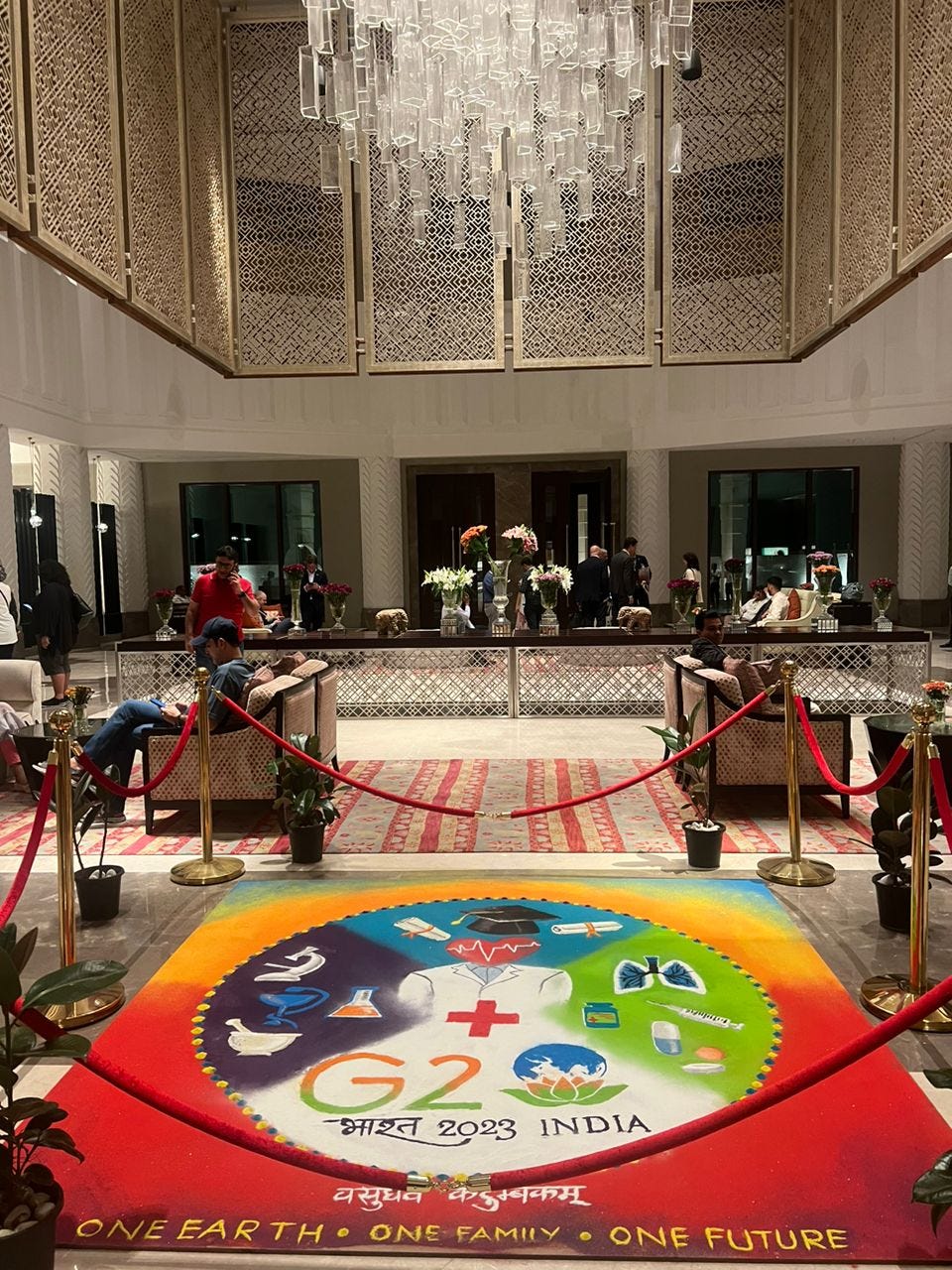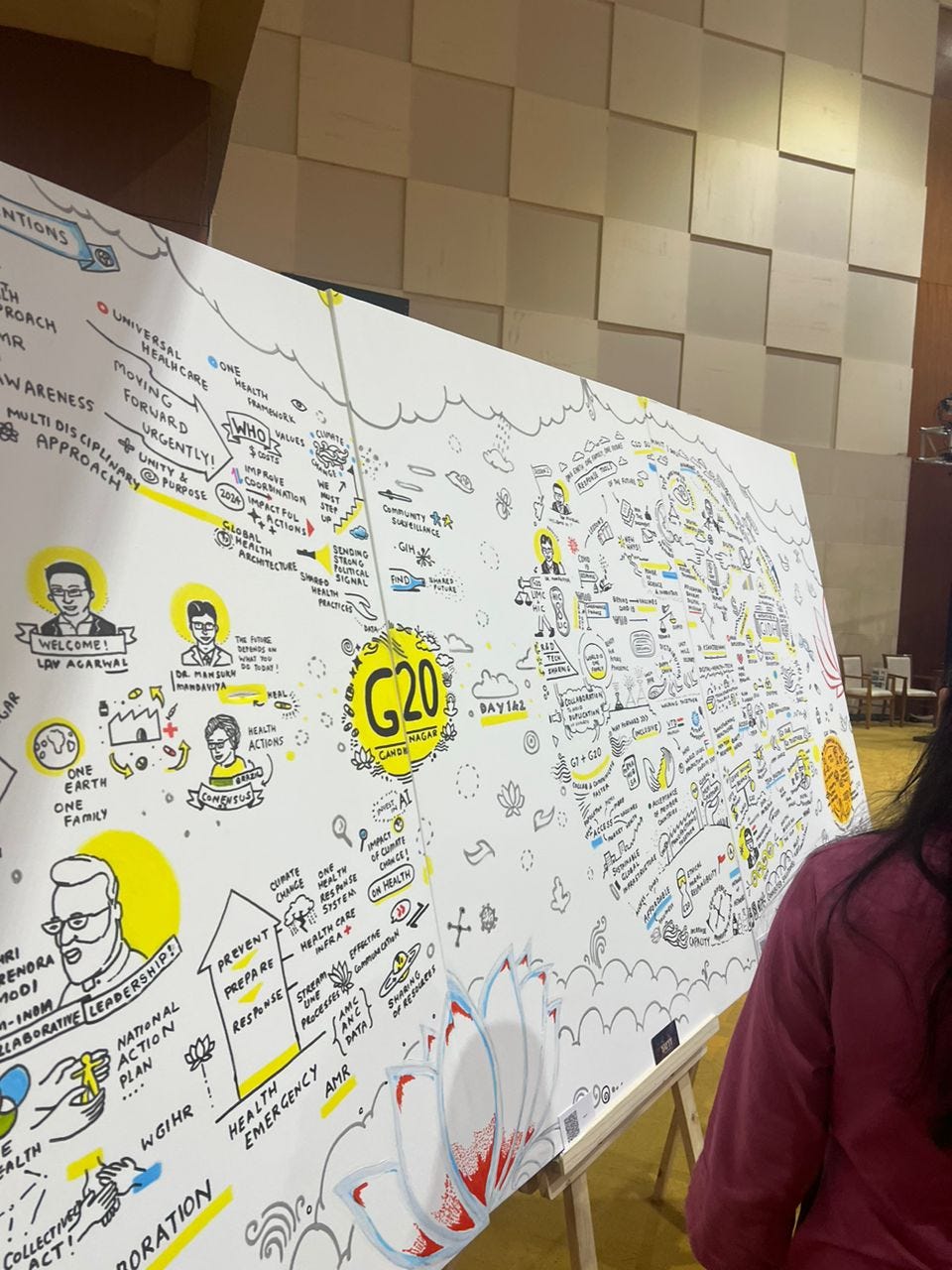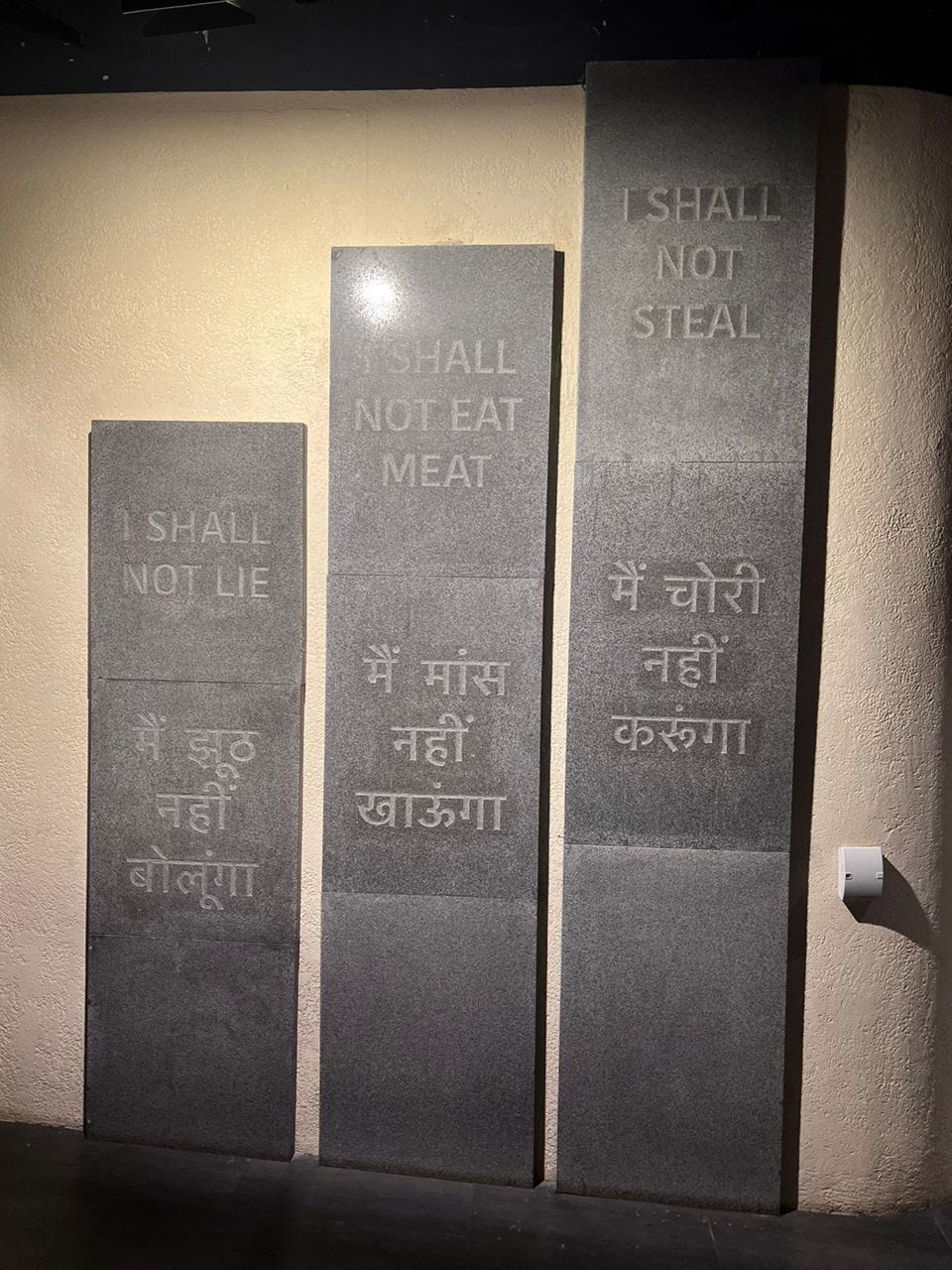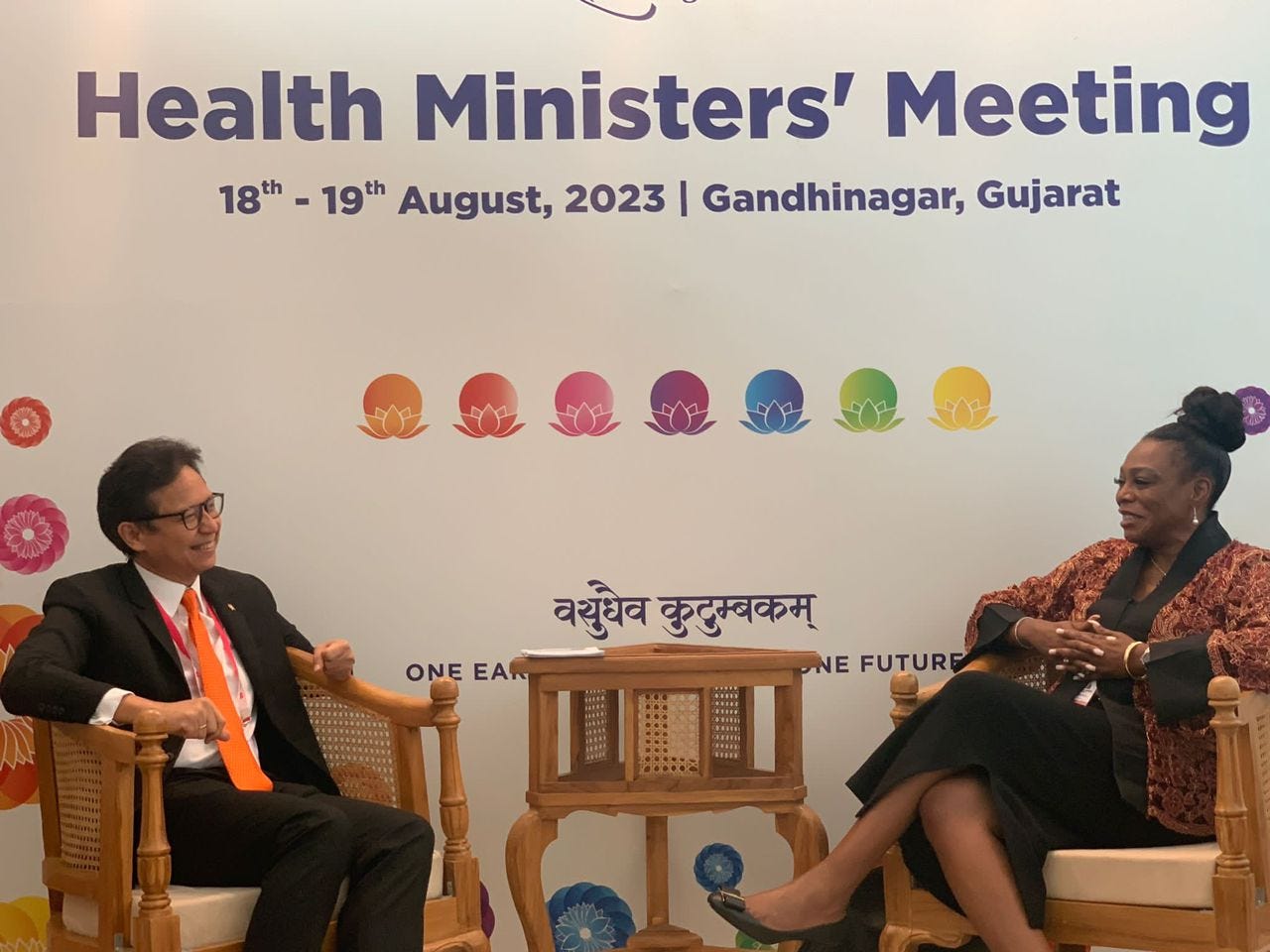I was in New Delhi earlier this week, among other reasons, to rendezvous with my sister and fellow FIND board member, Soumaya Swaminathan. I soaked in the aura of the city which felt on the cusp of something grand. Standing in the lobby of the lovely Oberoi hotel, a scene akin to a wedding dress rehearsal unfolded before me. The ethereal beauty of Indian weddings, with brides donning gold bracelets, elaborate henna designs, and radiant sarees, has always enchanted me.
Being in the streets of Delhi, especially after attending G20 Ministerial Meetings in Gandhinagar, felt as though the city readied itself for a majestic Indian wedding. And there is much reason for the already gorgeous Delhi to be spruced up like a bride — in about two weeks the 2023 G20 New Delhi Summit will be receiving heads of state and government of G20 countries as well as other countries invited by India.
It was not just being in Delhi that put me in that upbeat state. This past year – a monumental one for global health – has taught me so much about myself, about humanity, about our world, about how we view each other.
A world of myriad colors, textures, and sounds, the Indian tapestry is much like a kaleidoscope: always changing, always mesmerizing, always beautiful. Just as a kaleidoscope operates on the principle of multiple reflection, the G20 Health Ministers and Joint Health and Finance Ministers Meetings in Gandhinagar felt like a meeting of minds reflecting and refracting ideas, strategies, and hopes, channeling them into a coherent, vibrant vision for the future of global health.
The entire year of G20 meetings, especially the ones on health which I have been privileged to attend has been a whirlwind of experiences. Imagine for a moment a grand Indian bazaar. Every stall offers something unique, an essence of its origin and tradition. The noise might seem overwhelming, but listen closer, and you'll hear the harmonious blend of negotiations, shared aspirations, and mutual respect. Now, place this bazaar against the backdrop of the G20. The stalls are countries and regions, each offering its wisdom, strategies, and challenges. Some are age-old, woven from the very fabric of tradition; others are modern, gleaming with the promise of innovation. But every voice, every offering, is essential for this grand market to thrive.
Much like the Indian saree, an emblem of grace and diversity, the G20 meetings enveloped a range of topics, each thread contributing to the larger picture. A saree, a single piece of cloth, tells tales of regions, craftsmanship, and history. Similarly, each G20 dialogue weaved together diverse narratives, from traditional medicine to digital health, culminating in a rich tapestry of shared global aspirations.
These diverse threads also remind me of the aso-oke produced mostly in the western part of my country Nigeria. The fabric is traditionally woven by men on a horizontal loom in narrow strips or by women on a vertical loom. The narrow strips are sewn together to make the entire cloth. Weaving is a process of interlacing a set of threads at right angles to form a fabric.
Throughout our discussions, I've felt as if we were making a saree or an aso-oke. Every country, every representative, added their unique stitch, contributing to an intricate pattern of global health strategy. Much like the famed Indian Kantha quilts, made by stitching together different pieces of fabric, our G20 dialogues have sought to stitch together varied health narratives, solutions, and challenges to create a cohesive blanket of care, warmth, and unity.
India’s diligent civil service-Let's not forget, behind every great saree, every great aso-oke, there is a weaver. The weavers of our G20 tapestry were not only the ministers and delegates but also the diligent civil servants of India. Like meticulous artisans ensuring every thread is in place, these individuals, talented men and women, ensured every dialogue, every initiative, had purpose and direction. They ensured that at every event, we did not just experience professionalism, but also all of India’s splendour.
While political leaders often take center stage, India's triumphant hosting of the G20 and its portrayal of the Global South's potential is truly driven by the unsung civil servants executing the nation's policies. These dedicated individuals, representing some of India's brightest, have been instrumental in transforming the nation's socio-economic trajectory, elevating millions from poverty and unlocking untold opportunities. Their work, validated by tangible outcomes, exemplifies the profound impact of astute governance on a nation's fate. Despite critiques suggesting areas for reform within India's administrative service, its efficacy in policy implementation is undeniable. I earnestly aspire for nations like Nigeria to harness such administrative efficiency. An efficient civil service across the African continent can lead reforms and effectively cater to our extensive citizenry.
It has been a busy week and a half for me, attending dialogues as part of the G20 Health Ministers Meeting and the Health and Finance Ministers Joint Meeting, alongside numerous bilaterals.
Joint Health and Finance Ministers Meeting: In the backdrop of this monumental gathering in Gandhinagar, I can't help but be reminded of an old Indian proverb, "Ek aur ek gyarah hote hai," which translates to "One and one make eleven." This adage encapsulates the power of unity and collaboration. As Health and Finance Ministers converged from across the world, they came together not just as individuals but as a collective force that's exponentially greater than the sum of its parts.
The COVID-19 pandemic has vividly highlighted the inextricable link between health and our economic prospects. In its first year alone, the pandemic caused global economic growth to shrink by 3.5%, plunging an additional 97 million people into poverty and significantly escalating global public debt. We cannot bear the financial or human cost of such a calamity again. As Dr. Tedros Adhanom Ghebreyesus, the Director-General of WHO, underscored in the joint meeting, health should be viewed "not as a cost, but as an investment and not as a consumptive sector, but a productive sector.”
Notable outcomes from the Joint Health and Finance Ministers' meeting include both the framework for health, social, and economic vulnerabilities and risks as well as finance-health coordination. It also included asks for continued support for the Pandemic Fund; a commitment to surge financing mechanisms to ensure finance is available immediately to address an outbreak on day zero and the establishment and support for a Health Finance taskforce.
Health Ministers Meeting: Under its G20 presidency, India has spearheaded several vital initiatives in health. True to its status as a global digital hub, India launched the Global Initiative on Digital Health—a WHO-managed network designed to bolster country capacity and strengthen international cooperation in digital health. Throughout the G20 presidency, we have debated the potential of digital health to expedite health outcomes and achieve Universal Health Coverage (UHC). As I have previously noted, a critical element in this endeavor is universal access. In this regard, we have some distance yet to cover, considering the infrastructure and financing challenges faced by many lower and middle-income countries. We must persist in advocating for access to fulfill the transformative promise of healthcare for all, especially for those in hard-to-reach communities.
Gender- Inclusion of Women and Girls in G20 Outcome statement: I must express my lingering disappointment at the conspicuous scarcity of women in positions of power, evident both among G20 leaders—with only one female head of state, complemented by Ursula von der Leyen, President of the European Commission—and among Health Ministers, where only one woman holds the title. This issue goes beyond mere tokenistic representation. It's about genuine inclusion in decisions that impact half the world's population. If these decisions affect us, then they must also involve us. And on this note, I am grateful to Canada for supporting my call for women and girls to be specifically acknowledged in the G20 Health Ministers outcomes statement.
Traditional medicine: As someone from a country deeply rooted in traditional African health remedies, I was particularly heartened to see the WHO’s first ever Global Summit on Traditional Medicine take place in concert with the Health Ministers Meeting here in Gujarat. This alignment with the WHO Traditional Medicine Global Summit isn’t mere coincidence; it's a strategic recognition of the significance of ancestral health wisdom. Both in India and Africa, these treatments aren't mere alternatives but life-saving traditions. Our shared botanical legacies present a treasure trove of opportunities for collaborative research and innovation. It's heartening to see the preservation of this shared heritage while molding it to address modern health challenges.
Minister of Health for Indonesia, H.E. Budi G. Sadikin
The paramountcy of the INB process for pandemic treaty:
As eloquently stated by H.E. Budi G. Sadikin, Minister of Health for Indonesia, "No matter the difficulty, our strength lies in unity." It is imperative that we remain united in our pursuit to reshape the PPPR framework. At this crucial juncture in global health, we turn our attention to the UN High-Level Meetings in September and the forthcoming political declaration on Pandemic Prevention, Preparedness, and Response. As we advance the INB process for a Pandemic Treaty, I applaud the G20's consensus on establishing a medical countermeasures platform. However, as I've voiced before, the G20 cannot single-handedly shape a pandemic response framework for the entire globe. I'm heartened to see the G20's commitment to the INB process, ensuring a more equitable approach where all voices are valued, not just those of the wealthiest nations.
At this crossroads, the essence of true inclusivity cannot be overstated and demands that in addition to representation, every participant, even those with opposing views, is acknowledged. Every individual, institution, or entity impacted by or influencing these critical negotiations deserves a say. To achieve unity, transformation, and collaborative progress we must sidestep narrow, exclusionary mindsets in favor of pragmatic solutions, maintaining a discerning perspective.
Looking ahead to Brazil’s Presidency: I look forward to Brazil’s G20 Presidency, building on the inclusive processes India has initiated. As we continue to strengthen our global south voice in our contributions to these important dialogues, this moment in time of a global south Troika is a pivotal time for us to collectively shape our futures and rebalance power.
Brazil has announced that in its G20 Presidency it will continue to prioritize PPPR with a focus on surveillance and regional production; equity with a focus on access to innovations for health along with research and development; digital health with a focus on access; and climate change and the nexus of health and climate.
Dandi Kutir is the oldest and largest museum in India that is built around the life and teachings of Mahatma Gandhi.
Patience and Unity: Recently recovering from a bout of malaria, I am reminded of the importance of patience and resilience. Just as the body requires time and rest to recover, global health solutions need careful nurturing, steady commitment, and collaboration. We must sow the seeds of preparedness, inclusivity, and equity now, so that we can reap the benefits in the future.
I am energized by the fact that if we do the work now, if we all put our hands to the till, we will be able to have the protections necessary when another pandemic or global health emergency arises. My people say in Yoruba: Uun yi wo ba a gbe oun wa ka i, we le gbe ila du o ka koko. What you plant, is what you will harvest, you cannot plant okro and expect to harvest cocoa.
The spirit of the G20, exemplified by India's inclusive approach, resonates with the ancient Indian concept of "Vasudhaiva Kutumbakam,”: the world is one family. In an interconnected world, our health destinies are inextricably tied together — no one should be left behind. Let this G20 be a reminder that we can achieve more together than we ever could alone.
Hope Triumph and Chandrayaan-3: In an era where we turn to the Global South for inspiration and advocate for our position in a multipolar world, India's recent accomplishment stands out luminously. Chandrayaan-3, the pinnacle mission of the Indian Space Research Organisation's (ISRO) Chandrayaan programme, achieved a remarkable milestone on August 23rd 2023. Its rover gracefully touched down on the enigmatic lunar south pole, marking India as the first nation to explore this terrain and placing it among the exclusive league of lunar landing nations.
As we collectively weave a fresh narrative of global health, a tapestry woven with threads of hope, resilience, and unity, let us ensure that the next harvest in our global health story is a bounty of inclusivity, environmental consciousness, and interconnected destinies.










Good evening ma, I pray this meet you well, please ma help me with any job. I studied Biostatistics from ABU teaching hospital, 33years old and I have six plus working experience. I'm open to any job at all now cos I'm jobless. Thank you ma
Amen. Excellent and informative read. Thank you Yodi.
Safe travels and Blue skies always,
Dieye